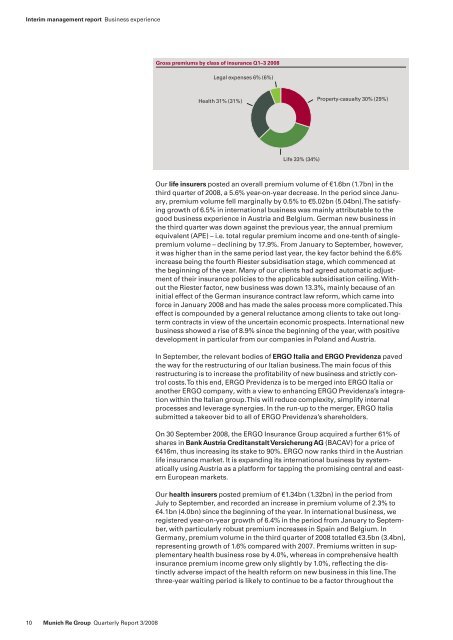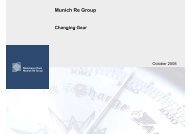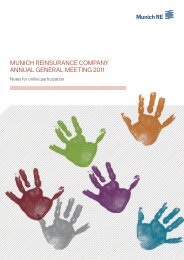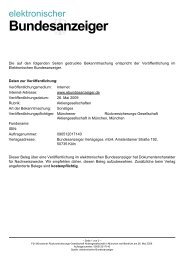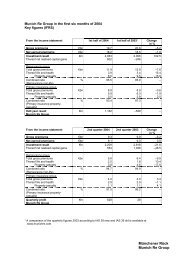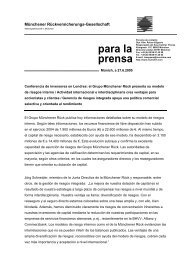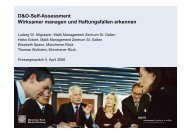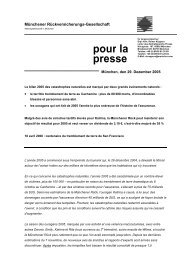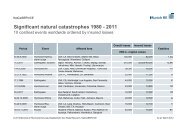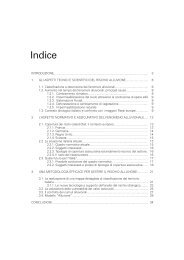Quarterly Report 3/2008 (PDF, 308 KB) - Munich Re
Quarterly Report 3/2008 (PDF, 308 KB) - Munich Re
Quarterly Report 3/2008 (PDF, 308 KB) - Munich Re
Create successful ePaper yourself
Turn your PDF publications into a flip-book with our unique Google optimized e-Paper software.
Interim management report Business experience<br />
10 <strong>Munich</strong> <strong>Re</strong> Group <strong>Quarterly</strong> <strong><strong>Re</strong>port</strong> 3/<strong>2008</strong><br />
Gross premiums by class of insurance Q1–3 <strong>2008</strong><br />
Legal expenses 6% (6%)<br />
Health 31% (31%)<br />
Life 33% (34%)<br />
Property-casualty 30% (29%)<br />
Our life insurers posted an overall premium volume of €1.6bn (1.7bn) in the<br />
third quarter of <strong>2008</strong>, a 5.6% year-on-year decrease. In the period since January,<br />
premium volume fell marginally by 0.5% to €5.02bn (5.04bn). The satisfying<br />
growth of 6.5% in international business was mainly attributable to the<br />
good business experience in Austria and Belgium. German new business in<br />
the third quarter was down against the previous year, the annual premium<br />
equivalent (APE) – i.e. total regular premium income and one-tenth of singlepremium<br />
volume – declining by 17.9%. From January to September, however,<br />
it was higher than in the same period last year, the key factor behind the 6.6%<br />
increase being the fourth Riester subsidisation stage, which commenced at<br />
the beginning of the year. Many of our clients had agreed automatic adjustment<br />
of their insurance policies to the applicable subsidisation ceiling. Without<br />
the Riester factor, new business was down 13.3%, mainly because of an<br />
initial effect of the German insurance contract law reform, which came into<br />
force in January <strong>2008</strong> and has made the sales process more complicated. This<br />
effect is compounded by a general reluctance among clients to take out longterm<br />
contracts in view of the uncertain economic prospects. International new<br />
business showed a rise of 8.9% since the beginning of the year, with positive<br />
development in particular from our companies in Poland and Austria.<br />
In September, the relevant bodies of ERGO Italia and ERGO Previdenza paved<br />
the way for the restructuring of our Italian business. The main focus of this<br />
restructuring is to increase the profitability of new business and strictly control<br />
costs. To this end, ERGO Previdenza is to be merged into ERGO Italia or<br />
another ERGO company, with a view to enhancing ERGO Previdenza’s integration<br />
within the Italian group. This will reduce complexity, simplify internal<br />
processes and leverage synergies. In the run-up to the merger, ERGO Italia<br />
submitted a takeover bid to all of ERGO Previdenza’s shareholders.<br />
On 30 September <strong>2008</strong>, the ERGO Insurance Group acquired a further 61% of<br />
shares in Bank Austria Creditanstalt Versicherung AG (BACAV) for a price of<br />
€416m, thus increasing its stake to 90%. ERGO now ranks third in the Austrian<br />
life insurance market. It is expanding its international business by systematically<br />
using Austria as a platform for tapping the promising central and eastern<br />
European markets.<br />
Our health insurers posted premium of €1.34bn (1.32bn) in the period from<br />
July to September, and recorded an increase in premium volume of 2.3% to<br />
€4.1bn (4.0bn) since the beginning of the year. In international business, we<br />
registered year-on-year growth of 6.4% in the period from January to September,<br />
with particularly robust premium increases in Spain and Belgium. In<br />
Germany, premium volume in the third quarter of <strong>2008</strong> totalled €3.5bn (3.4bn),<br />
representing growth of 1.6% compared with 2007. Premiums written in supplementary<br />
health business rose by 4.0%, whereas in comprehensive health<br />
insurance premium income grew only slightly by 1.0%, reflecting the distinctly<br />
adverse impact of the health reform on new business in this line. The<br />
three-year waiting period is likely to continue to be a factor throughout the


